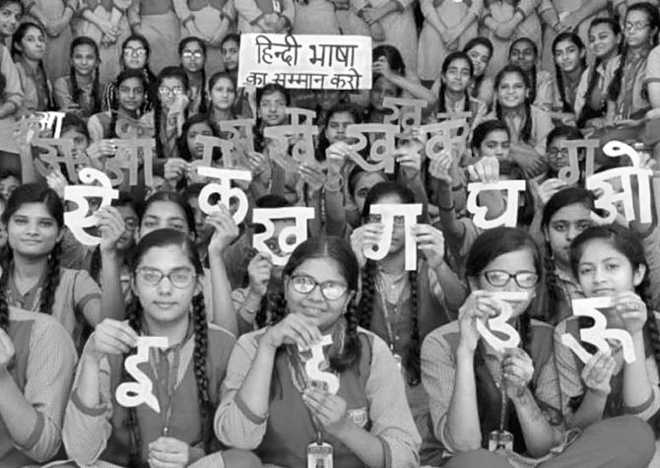MANI SHANKAR AIYAR
Because he was a Brahmin, my father found it impossible to get a job in Madras Presidency when he graduated in 1927. He, therefore, set out for Lahore to find his fortune. And there he lived till Partition drove him out of the city that he had regarded as his home for 20 years. It was also the city where I was born. As Tambram refugees from Pakistan, we probably constitute the smallest minority in India!
The first language I learnt was Tamil. It was also the first language I forgot. When I was still under eight, I was sent off, with my brother Swaminathan (then just over six), to a boarding school in Dehradun where English was the lingua franca but with a fair amount of spoken Hindi thrown in. By the time we had spent a year in the school, much of our Tamil had disappeared from our tongues. But because my mother, a Tamil scholar and poet, was passionate about the language, we developed a family habit of her speaking to me in Tamil and I responding in English. At the same time, my Hindi teacher, HD Bhatt, so effectively stoked my interest in that language that I actually represented my House in school debates in Hindi. Meanwhile, I appeared for the Higher Tamil paper in my school-leaving exam — and failed miserably. But if it had not been for my mother and my having had to study the Tamil classics under her strict supervision — neither understanding nor remembering much of what I was compelled to read — I doubt that I would have had the gall to seek a ticket to contest the Tamil Nadu Lok Sabha election in 1991.
The electorate in Tamil Nadu is a forgiving lot. It took my wholly inadequate Tamil in their stride and returned me to Parliament with a majority of 1.5 lakh votes. It particularly enjoyed my joke that while it spoke “chen Tamizh” (pure Tamil), I spoke “yen Tamizh” (my Tamil)! Over the last three decades of fighting all elections (but the last) in Mayiladuturai, in the very heart of Chozha Nadu (the land of the Cholas), my Tamil has improved but it is nowhere near the oratory level.
I am, therefore, that curious creature: a Tamil politician with three Lok Sabha victories on my CV, comfortable only in English, fluent (if sometimes faulty) in Hindi, and passable but hardly laudable in Tamil, and extremely proud of having returned my family to its homeland after a forced absence of nearly seven decades. I have at long last found my roots.
My alienation from my roots, now partially compensated by having spent more than half my working life of nearly 60 years going to every village panchayat and every ward in my constituency, makes me acutely aware of the importance of language in securing and holding on to an identity. I, therefore, find it bewildering that Hindi fanatics, who are legion in the ruling dispensation, do not seem to be sensitive to the linguistic dimension of identity even while they push religion as the marker of identity. There was absolutely no call to disturb the balance in the education policy achieved in 1967 by the Congress government of Indira Gandhi. It is the only possible path to achieving national unity and harmony. For more than half a century, there have been no language agitations on the scale that rocked the Tamil people in 1937-40 and again in 1965. Why stir things up now as the Commission set up to work out an education policy has provoked by its suggestion (now withdrawn, but still pending a Central government decision) to enforce a “three-language” formula that aims to undermine the 50-year consensus. The idea was to allow states that did not want to include Hindi in their educational curriculum to not do so.
Note that neither Tamil Nadu nor Tamils have suffered on account of the refusal of Dravidian governments over the last half century to teach Hindi in government schools and banning the broadcasting of Hindi news on All India Radio and Doordarshan. Indeed, Tamil Nadu has flourished on every index of economic and human development and got more firmly integrated with the Indian Union than when concerns over identity drove Periyar in the 1940s towards seeking secession to form a sovereign, independent Dravida Nadu, a demand that CN Annadurai, leader of the DMK, withdrew only during the Chinese invasion in 1962. Not only have Tamils flourished in Tamil Nadu, both Brahmin and non-Brahmin Tamilians are to be seen thriving in all parts of India and abroad, speaking Hindi (albeit with atrocious accents) when they wish to or have to. More to the point, there has been the warmest welcome extended to people from the rest of India, including one-language Hindi speakers, who have come in droves to work in Tamil Nadu.
The emotional unity of the nation has been strengthened, not weakened, by allowing linguistic pride to blossom, nothing having contributed to this more than the UPA government under Dr Manmohan Singh having accorded to Tamil the Constitutional status of a “classical” language on par with Sanskrit. This is the way to emotional integration of the nation, not by forcing Hindi down the throats of an unwilling populace as much of the Hindutva brigade wants to do.
Unlock Exclusive Insights with The Tribune Premium
Take your experience further with Premium access.
Thought-provoking Opinions, Expert Analysis, In-depth Insights and other Member Only Benefits
Already a Member? Sign In Now










